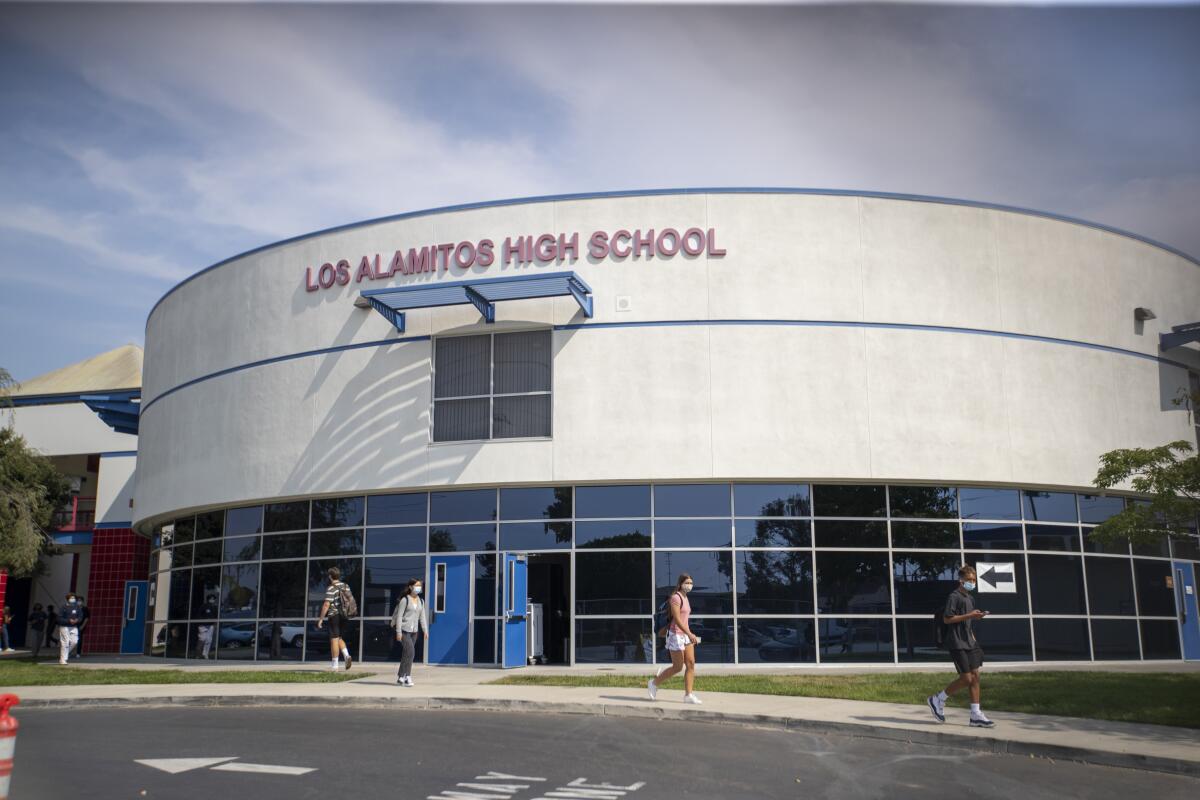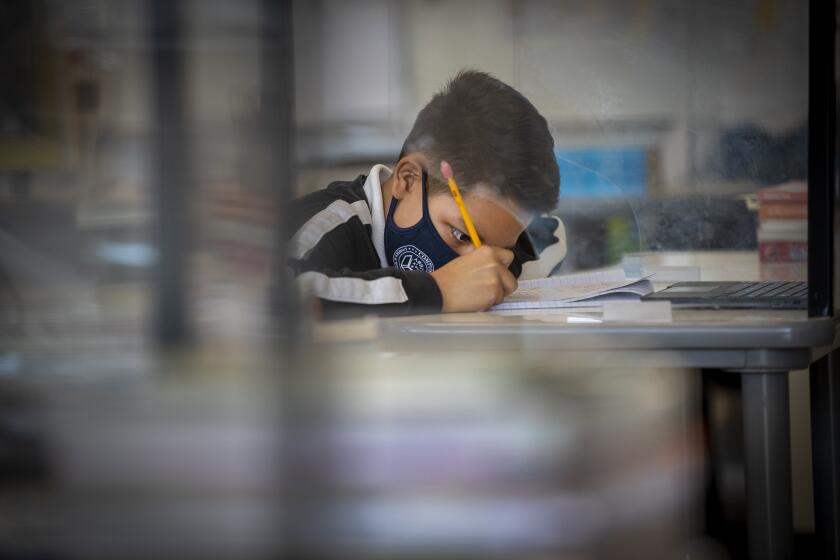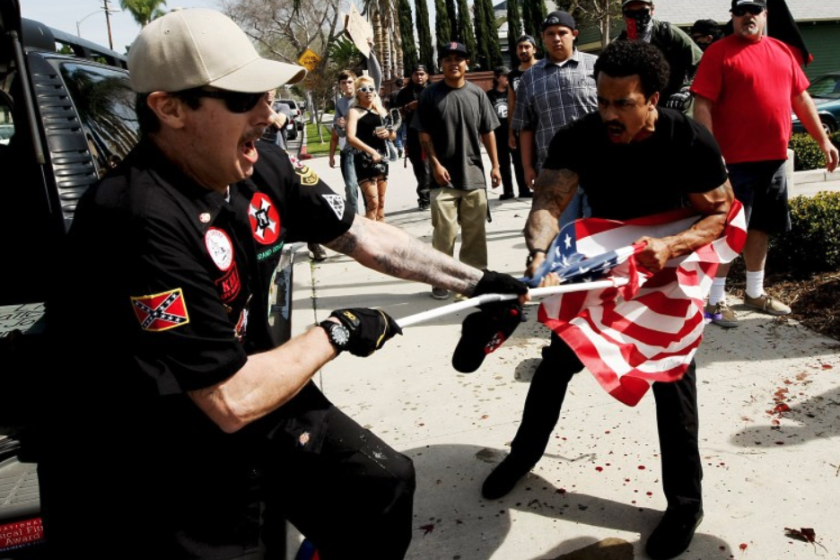Orange County debates ethnic studies: Vital learnings or ‘anti-white’ divisiveness?

- Share via
California’s new ethnic studies curriculum is being put to an early test in Orange County, where organizers are riling up parents in the Los Alamitos Unified School District to oppose elective coursework and materials they say promote divisive, anti-white rhetoric.
“These courses are filled with hate for America and all America stands for,” opponents wrote in a letter to the Los Alamitos community, adding that the curriculum “teaches children that America is based on white supremacy and that white people are racists, even if they don’t know it.” It’s an extreme view in a state that is a national leader in ethnic studies education, but the opposition is gaining a footing in some conservative corners.
The ethnic studies model curriculum — which is intended to help educators develop classes that guide students through the histories, struggles and contributions of Asian, Black, Latino and Native American communities, among other groups — was unanimously approved in March by the state Board of Education after nearly two years of discussions, protests and rewrites.
But the lessons hailed by state Board of Education President Linda Darling-Hammond as a path to helping students “understand the forces that stand in the way of our shared humanity” are prompting some in Los Alamitos to push back.
Los Alamitos is not the only school district grappling with how to develop ethnic study courses. But its position within a county that is confronting anti-Asian hate, white nationalism and a seismic political shift has made the controversy over the curriculum a case study for more conservative parts of the state.
In the nearby Placentia-Yorba Linda Unified School District, school board member Leandra Blades shared an article on Facebook that denounces the state’s curriculum as “left-wing political ideology.” And in Santa Clara County, more than 500 parents signed a letter calling their board’s initiative “militant and anti-Western.”
During an April 13 meeting of the Los Alamitos Board of Education, about 15 of 20 speakers voiced opposition to the district’s plan to offer an 11th- and 12th-grade elective course guided by materials in the state’s ethnic studies framework. One attendee held a sign that read “Ethnic studies teaches hate,” while several parents and grandparents said the coursework will segregate students and make them into victims.
But at a board meeting Tuesday night, the tables were turned, and dozens of students and community members voiced support for the course. Natalie Chang, who has two children in the district, said she was motivated to participate after some speakers at previous board meetings transformed the room “into a place full of hate speech.”
“To everyone disseminating misinformation, stoking fear and division, heckling, booing and laughing at students and parents who speak up, please know that your words and your actions are just solidifying how desperately we need ethnic studies and social justice standards,” she said.
The board unanimously approved the elective course in February, but the contents of the class are still under review. In addition, officials are preparing for a May 11 vote on whether to incorporate social justice standards developed by the Southern Poverty Law Center’s Learning for Justice group into its K-12 framework.
Some educators, like Los Alamitos High School teacher Cynthia Aviña, said the controversy is overshadowing the district’s intentions. Hearing the course described as “anti-white” and “divisive” has been challenging, she said, because “it’s the complete opposite of that.”
“Teachers and students who want to engage in this work should be able to without the fear of being harassed or intimidated,” said Aviña, who is slated to teach the ethnic studies elective this fall. “The fact that that’s happening is very alarming.”
White students make up about 44% of the 9,700-student Los Alamitos school district; 28% are Latino; 14%, Asian; 3%, Black; and about 11% identify as multiracial or other. Just under 20% of students come from low-income families and qualify for free or discounted lunches.
An annual survey about quality of life revealed stark differences by socioeconomic status, telling a “tale of two L.A.s.”
Proposed materials for the elective course, which is titled “Ethnic Studies: Cultural Experiences in the United States of America,” include Ronald Takaki’s “A Different Mirror: A History of Multicultural America,” Robert F. Heizer’s “The Destruction of California Indians” and the film “Viva La Causa,” directed by Alonso Mayo and Bill Brummel, about the life of César Chávez.
“This course really is developed so that students will develop racial literacies through a personal and systematic analysis of race in the United States,” Los Alamitos deputy superintendent Ondrea Reed said during a presentation about the elective in February.
Opponents said Reed’s presentation led them to believe the coursework will incorporate “critical race theory” — an academic lens to examine how race and racism are embedded in institutional and systemic inequities in America. Frequently attacked by former President Trump, critical race theory is seen by ethnic studies practitioners as inseparable from the field, and its inclusion was approved by the state board.
“When you read through the slides, you see nothing but critical race theory verbiage,” said Harriette Reid, an opponent of the curriculum who has spoken at several school board meetings. Reid, who described herself as a “freedom-loving American,” is retired and does not have children in Los Alamitos schools. She criticized the district’s use of language like “intersectionality,” “institutional oppression” and “microaggressions” in proposed courses and expressed concern that materials are “fully invested in critical race theory.”
Last week, a handful of parents and opponents organized a town hall meeting at Cornerstone Church that was attended by nearly 200 people. Reid was among the speakers, as were conservative activists Marc Ang and Arthur Schaper and former Huntington Beach City Council contender Sonya Green.
“This is ideology,” Reid told the crowd, “and it might be in direct conflict to what you’re teaching your child.”
Around the room, screens displayed the message “Critical Race Theory is coming to Los Alamitos Schools: Are these your values?”
Though critical race theory has become a flashpoint in the debate over ethnic studies, it is hardly mentioned in the state’s 882-page model curriculum. The ethnic studies framework does not mandate how to teach courses but offers up lessons and approaches to curate a class, said Scott Roark, a spokesman for the California Department of Education.
“The model curriculum doesn’t ascribe to any particular theory within the ethnic studies discipline,” Roark said, noting that a footnote was recently added that clarifies the definition of critical race theory.
“This is a concept that is often misunderstood as creating divisions among groups or setting people against one another. That is not the point or goal of critical race theory,” Darling-Hammond said before the board approved the curriculum last month. “It refers to critical thinking about race, not to criticism of specific individuals based on their race.”
Those who study racism and bias in America say recognizing privilege and the systems that harm marginalized groups is a necessary step toward overcoming divisions.
“The country is going through this racial reckoning, and part of that racial reckoning is understanding our history,” said Daniel Solorzano, director of the Center for Critical Race Studies in Education at UCLA. “We do have a racist history, and ethnic studies talks about that. They engage in that conversation. … We need to have those conversations.”
President Trump has directed the Office of Management and Budget to take aim at federal agencies’ anti-racism training sessions.
Los Alamitos Supt. Andrew Pulver said the district has never stated that the ethnic studies course will be presented through the lens of critical race theory.
“We’re trying to refute a lot of the miscommunication,” he said. “We want to encourage cultural understanding of how different groups have struggled. Some people think it’s just about oppression, but we’re going to hopefully be able to highlight core ethnic studies concepts such as equity, justice and race.”
Many parents said they would rather not see the topics addressed in a school setting at all.
“Teaching morals isn’t the schools’ job, it’s my job,” said Brian Dines, who has two children in the district, after the meeting.
During the town hall, Schaper, organizing director of conservative activist group MassResistance, spoke about his work opposing sex education and LGBTQ “safe zone” stickers at schools in Downey and advised parents who oppose the ethnic studies curriculum to organize against members of the school board and “make their lives miserable.”
“We are not seeking common ground with these people,” Schaper said. “This is filth that needs to be removed completely.”
Diana Hill, vice president of the Los Alamitos school board, said she was discouraged by the tenor of the conversation at the town hall.
“I offered to be a resource if anybody wanted to ask any questions about what was presented, and they never made that available to the group,” she said. “There was a lot of misinformation.”
The heated discussion reflects a national partisan debate. Last September, Trump put critical race theory in the spotlight when he directed federal agencies to cease antiracism training sessions, calling them “divisive, un-American propaganda” that engender division and resentment.
Much of that language has made it to Los Alamitos.
“It divides instead of unifies,” said Maria Palmer, whose grandchildren are juniors and seniors in the Los Alamitos school system. “Hispanics, Indians, Asians and Blacks will all feel like victims, and Caucasians will feel like oppressors.”
UCLA’s Solorzano said similar language appeared in a law that banned ethnic studies in Arizona for several years.
“This is happening all across the country,” he said. “They are basically using that language to challenge anything that would bring the voices and experiences of people of color into classrooms, into schools, into different spaces.”
That resistance was evident when one Los Alamitos High School student tried to speak in favor of the ethnic studies curriculum during the April 13 meeting of the school board.
“As a community that has struggled with racism and all manner of xenophobia, we need to ask the community to denounce hate wherever we see it,” said the student, Hunter Dunn. “Please stop saying this class is going to teach us that white people are devils. It’s not.”
When Dunn said, “White privilege is a real thing,” he was met with jeers and laughter from several attendees.
Nico Muench-Casanova, who also attends Los Alamitos high, emphasized Tuesday night that the ethnic studies course was an elective and important “because it tells the stories that help us belong.”
The far right in Orange County remains a force and is building on a long history of extremism.
School officials said they will continue to share their plans for the ethnic studies elective, which will be considered for approval by the board on June 1. And Reid, Ang and Green said they plan to spread their message of opposition to other districts.
But supporters of ethnic studies in California, which has one of the most diverse student bodies in the nation, have some momentum. A bill to make an ethnic studies course a high school graduation requirement is making its way through the Legislature, recently passing the Assembly Education Committee.
Already, some districts in Orange County, including Santa Ana, are working to make ethnic studies a graduation requirement. Last August, Los Angeles Unified School District voted to make its ethnic studies course mandatory beginning in the 2023 school year.
More to Read
Sign up for Essential California
The most important California stories and recommendations in your inbox every morning.
You may occasionally receive promotional content from the Los Angeles Times.














